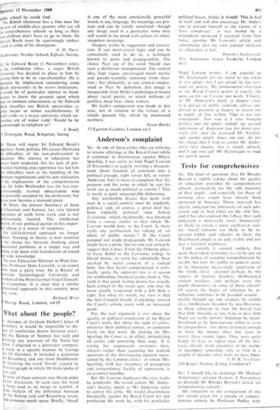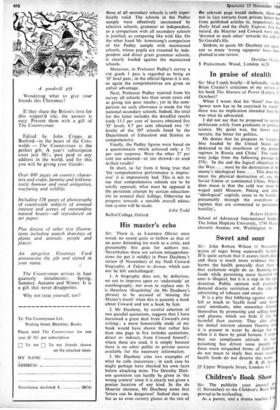Tests for comprehensives
Sir: The kind of questions that Dr Rhodes Boyson is rightly asking about the quality of education provided by comprehensive schools. particularly for the able minority of their pupils----and especially for those of working class origin have already been answered in America. There, research has clearly indicated the inferiority of such edu- cation and its bad effect on the able few; and it has also exposed the fallacy that such education is necessarily more 'democratic' or likely to create a more egalitarian soci- ety. Social tensions are likely to be in- creased within such schools; in short, the blackboard jungle is an ugly reality and not just a fictional nightmare.
Until recently it seemed unlikely that more than token resistance was to be put up to the policy of creeping comprehension by stealth, but now the public in general seems to be bee-timing increasingly suspicious of the whole affair -alarmed perhaps by the reports of fugitive teachers, disillusioned student teachers, and perhaps even the pupils themselves in some of these schools! Of course the bogey of selection by in- telligence continues to be paraded around-- mainly thought up, one suspects, by middle class intellectuals besotted by neo-Marxism. or those reluctant to face the horrid fact that little Amanda or tiny Jane or dear little Nigel are really nitwits! Selection by neigh- bourhood or by bureaucratic whim or even by cheque-book--for those fortunate enough to have the money—does not seem to worry these trendy types. They seem quite happy to have us repeat here all the mis- takes already made elsewhere in the matter of secondary schooling, only to find in a couple of decades what fools we have been.
H. K. Lockhart 21b King's Avenue, Ealing, London w5 Sir: I should like to challenge Mr Michael Armstrong's attempt (Letters, 8 November) to discredit Dr Rhodes Boyson's article on comprehensive schools.
His objection to the comparison of the GCE results given for a sample of compre- hensive schools by Professor Pedley with those of all secondary schools is only super- ficially valid. The schools in the Pedley sample were effectively uncreamed by selective schools, grammar or independent, so a comparison with all secondary schools is justified, as comparing like with like. On the other hand Mr Armstrong's comparison of the Pedley sample with maintained schools, whose pupils are creamed by inde- pendent and direct grant grammar schools, is clearly loaded against the maintained schools.
Moreover, in Professor Pedley's survey a CSE grade 1 pass is regarded as being an '0' level pass ; in the official figures it is not, so again the comprehensives are given an unfair advantage.
Next, Professor Pedley rejected from his survey all schools less than seven years old as giving too poor results ; yet in the com- parison no such allowance is made for the national secondary schools. Indeed, the total for the latter includes the dreadful results (only 13.5 per cent of leavers obtained five '0' levels, 6.7 per cent obtained two 'A' levels) of the 507 schools listed by the Department of Education and Science as comprehensive.
Finally, the Pedley figures were based on a questionnaire which achieved only a 73 per cent response. Were the other 27 per cent too ashamed—or too shrewd—to send in their results?
In short, so far from it being true that 'the comprehensive performance is impres- sive' it is impressively bad. This is not to say that comprehensive schools are to be totally opposed; what must be opposed is the persistent attempt by certain education- ists to conceal their failings. Otherwise no progress towards a sensible overall educa- tion system will be made.
John Todd Balliol College, Oxford







































 Previous page
Previous page